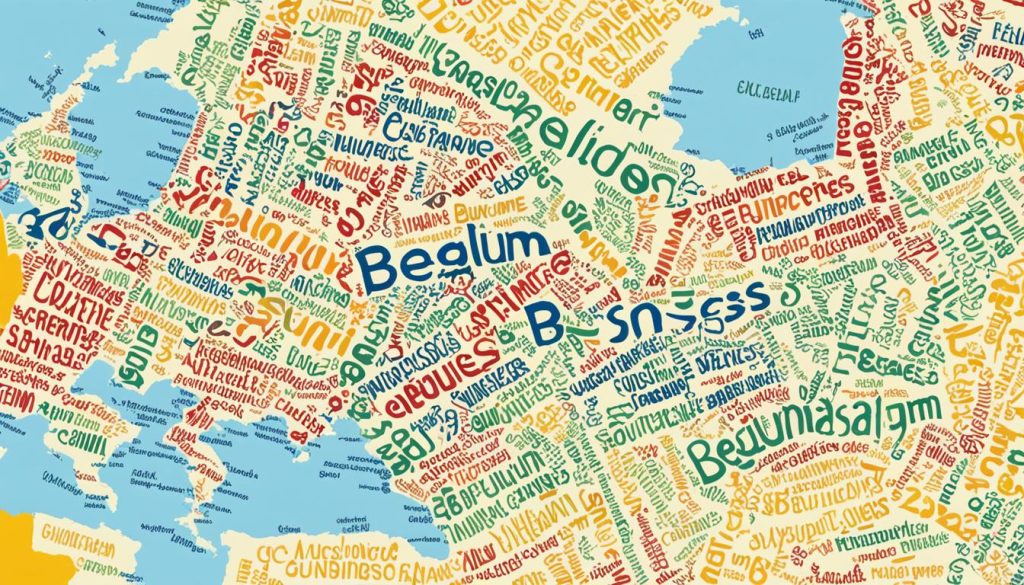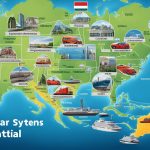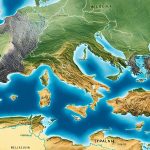Let’s start a fascinating journey through Belgium, Spain, and the Netherlands. Here, we’ll explore the mix of European business practices and cultural differences. Our journey into the Belgium-Spain-Netherlands comparison sheds light on how culture and economy mix. We’ll see how unique elements from each country shape its market and cultural life.
Our deep dive into these countries reveals how their economies tell a story of global trade and cultural identity. Together, they show the vibrant mix of conducting business and interacting culturally in international markets. This comparison will open up the complicated, yet beautiful blend of business innovation and cultural richness in Europe.
Geographical and Historical Context
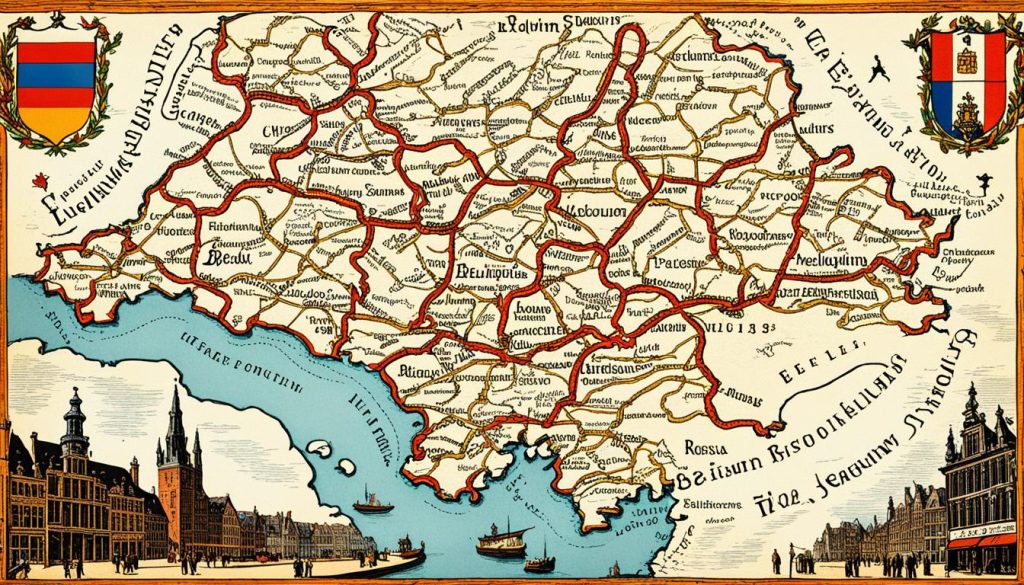
Europe’s history is rich with stories of nations forging their destinies. Belgium and the Netherlands, at Europe’s heart, have a shared commercial and political history. This has helped shape their role in today’s world. Their geography and past events have set them on unique developmental paths. They are now key players in global commerce and governance.
Divergent Paths to Modern Prosperity
Belgium became an independent country in 1830. This was a key moment for it. The country has grown through many global conflicts. It has become a tech leader in Europe. At the same time, the Netherlands moved from being a sea power to a leading agricultural nation. It works closely within the European Union.
Shared History and Separation
Looking closely, Belgium and the Netherlands have unique yet shared histories. After Belgium gained independence from the Dutch, both countries followed different paths. They faced challenges like wars and foreign rule. Yet, they stood strong in the global community.
Strategic Location in Europe
The locations of Belgium and the Netherlands in Europe are crucial. Brussels and Amsterdam are more than just capitals. They are key centres for diplomacy and trade. Brussels is home to NATO and EU institutions. Amsterdam is known for its innovative businesses and culture.
- Belgium’s role as a hub for technology and international politics
- The enduring influence of the Netherlands’ commercial history in shaping modern Europe
- The impact of strategic European locations in world economy and diplomacy
The link between geography and history is complex but inspiring. It shows how European nations have evolved. Understanding this helps us grasp today’s global economic dynamics.
Demographics and Population Distribution
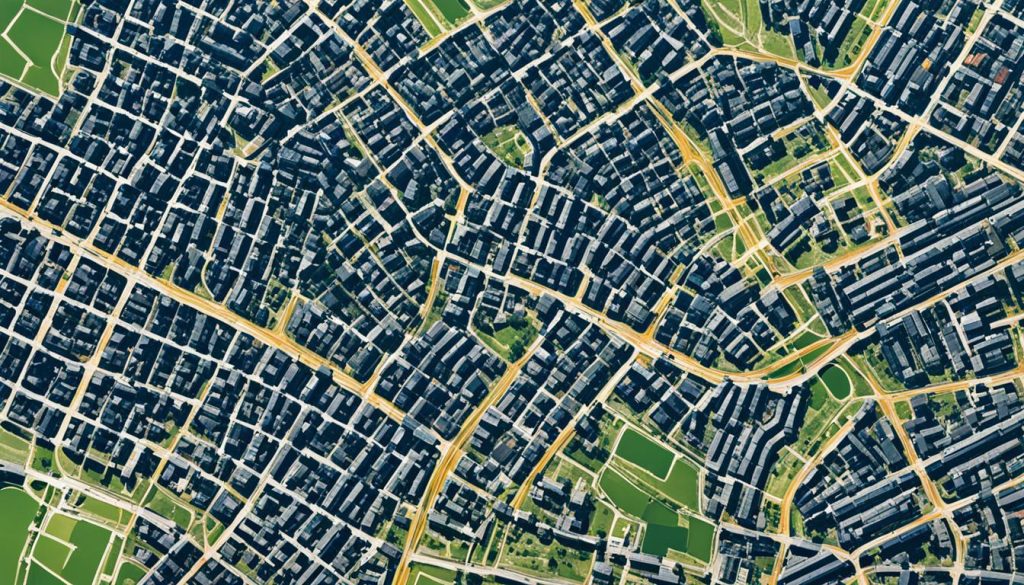
Belgium and the Netherlands are neighbours in Europe’s heart. They share more than a border. These countries show trends in urban density and demographics reflecting changes in European societies. Looking at their population dynamics reveals growth patterns and a push towards urban living.
Complex Cultural Tapestry
The demographics of Belgium and the Netherlands show a mix of cultures and languages. Belgium has a split between Flemish-speaking Flanders and French-speaking Wallonia. The Netherlands has communities from Indonesia, Suriname, and the Middle East. This mix shapes each country’s unique identity.
Population Density and Urbanisation
Urban density is key in these countries. Belgium has nearly 12 million people, with many living in cities like Brussels and Antwerp. In the Netherlands, urbanisation is even more visible. The Randstad area highlights this with cities like Amsterdam and Rotterdam.
- Belgium is one of Europe’s most densely populated countries, with 97% urbanisation in the north.
- The Randstad in the Netherlands is a top example of urban density in Europe.
Exploring demographics and urban trends in these countries helps us understand their impact on society. As urban areas grow, the relationship between people and cities shapes regional futures.
Economic Overview and Trade Connections
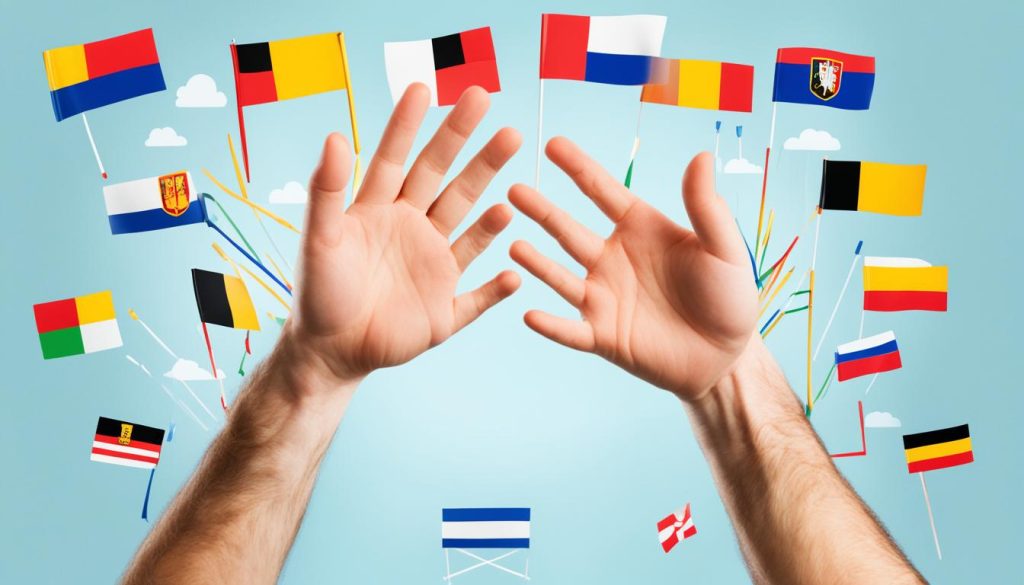
Belgium and the Netherlands have a strong economic bond marked by a history of industrial progress and beneficial trade. These countries lead in key economic areas, serving as models for Europe and the world.
Industrial Pioneers and Digital Innovators
Belgium’s role in the industrial revolution is impressive, especially in Wallonia. This region is famous for biotech and digital progress. The Port of Antwerp plays a key role in trade between Belgium and the Netherlands, benefiting the whole continent.
Interconnected Economies Through Trade
The trade between Belgium and the Netherlands shows how connected their economies are. The Netherlands has a big port system. It helps in trading not just with Belgium but with Europe’s big economies, like Germany. Their strong trade links are helped by good locations and investing in digital technologies.
- Port of Antwerp as a critical node in Europe’s supply chain
- Netherlands’ ranking in the World Bank’s Logistics Performance Index reflective of its trade efficiency
- Innovation in sectors ranging from agriculture to high-tech industries
The economic systems of both nations highlight the power of working together. Their focus on industrial progress and trade across borders shows their strength.
Cultural Identities and Business Etiquette

In the world of global trade, knowing about cultural identities and customs is key. It’s as important as making plans for success. Looking into how Belgium, Spain, and the Netherlands handle business shows how diverse cultures interact. It’s all about different ways to communicate. Being aware of these differences makes business go smoothly. It also helps build lasting, strong relationships.
Language and its Influence on Business
Language is key to talking effectively across different cultures. In Belgium, where people speak three languages, language shapes how business is done. It’s crucial to be sensitive and understand this to gain trust in Belgian business communities. Being able to speak multiple languages is a big plus. It can really help you succeed in the local market.
Formality and Business Interactions
How formal or casual business is varies widely in Europe. In Spain, business tends to mix formality with friendliness. Yet, in Belgium and the Netherlands, business interactions are more formal and reserved. Being good at dealing with different cultures is essential. It shows why it’s important to adjust to local ways to prevent misunderstandings.
Understanding Local Business Hierarchies
Knowing how hierarchies work is vital in international business. Being aware of hierarchies affects decision-making and the speed of business talks. In Belgium, the hierarchy mirrors the culture’s respect for status and titles. When doing business in such environments, it’s crucial to respect these structures. This respect leads to effective and polite business meetings.
Natural Resources and Sustainable Development

Being mindful in managing natural resources is crucial for green development. Belgium and the Netherlands are leading by example. They use their natural gas, ample sand, and fertile land for sustainable growth. For these nations, sustainability means innovation, smart policies, and working together globally.
Renewable Energy Initiatives
In the quest for a greener future, Belgium and the Netherlands have turned to renewable energy. They’re investing heavily in wind, solar, and biomass. This effort is to weave eco-friendly energy into their societal fabric. They aim to make green development a core part of their progress.
Challenges and Environmental Policies
The journey to becoming greener is not without hurdles for Belgium and the Netherlands. They face flooding risks and the effects of heavy urban and industrial activities. To combat these, they’ve crafted detailed environmental policies. They’ve joined international sustainability pacts, showing their commitment to a healthier planet.
- Intensification of renewable energy as a key energy source.
- Strategic urban planning to mitigate environmental hazards.
- Adoption of international protocols aimed at sustainable practices.
Education and Its Role in Economic Development
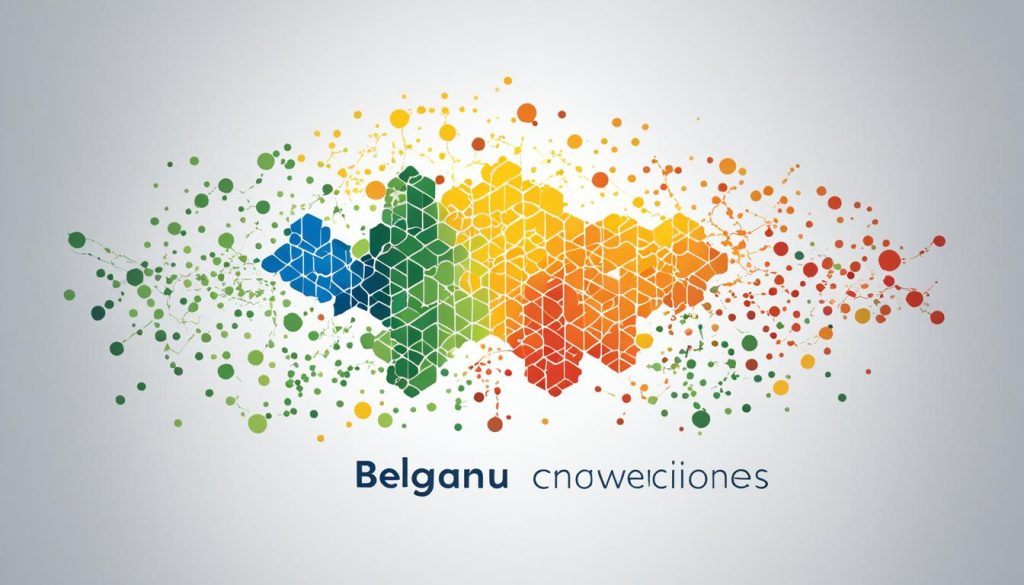
Education strongly influences economic growth, as seen in Belgium and the Netherlands. These countries show how learning leads to societal progress. They boost their economies by focusing on education and skill development.
Emphasis on High Educational Standards
In Belgium, high education standards create a knowledgeable society. This prepares Belgium to perform well globally. Belgian universities are famous for their tough standards and research strength.
Impact on Professional Expertise and Skill
The Netherlands focuses on professional and technical education. This has created experts in fields like biotechnology and engineering. These professionals are key to the country’s economic growth.
- Alignment of educational systems with industry requirements for sustainable economic growth.
- Boost to a knowledge-based economy fueled by ongoing professional development.
- Positive correlation between investment in education and advancements in technological and scientific sectors.
Belgium and the Netherlands show that education leads to economic success. Their focus on linking learning with economic innovation drives prosperity.
Labour Market Characteristics and Productivity
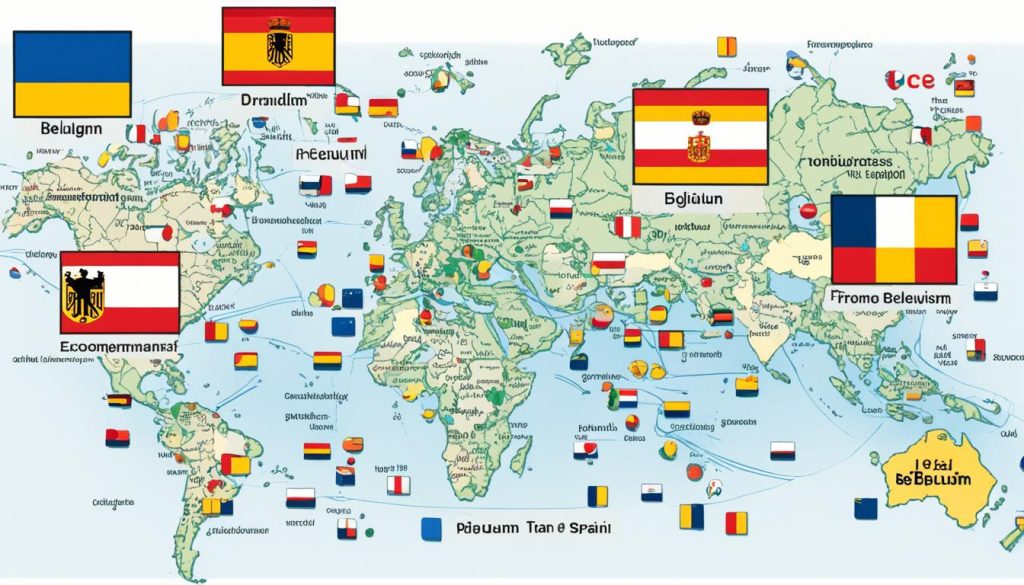
An exploration into the labour market trends of Belgium, Spain, and the Netherlands reveals distinct approaches. They focus on workforce productivity and employment dynamics. Understanding the nuances of each nation’s labour market is key as European economies connect more.
Belgium shows a strong purchasing power index. This makes it an example of labour efficiency.
Labour Dynamics in Belgium, Spain, and Netherlands
The labour markets in these countries show a complex picture shaped by their history and unique opportunities. Belgium boasts high labour productivity, proving the efficacy of its workforce in a competitive setting. Spain and the Netherlands face their own challenges and strengths in employment, influencing both regional and wider market trends.
Cross-Regional Comparisons of Workforce Efficiency
- Assessment of Belgium’s workforce reveals a balanced interplay between productivity and workers’ quality of life.
- In Spain, the labour market experiences fluctuating trends, influenced by both its vibrant tourism sector and varying regional economies.
- The Netherlands, with its structured labour policies, showcases a robust model for integrating high levels of workforce productivity within an innovative economy.
Through comparative analysis, it’s clear labour market characteristics are crucial for economic health. Workforce productivity reflects not just individual output, but the overall economic condition. By highlighting the unique employment dynamics in Belgium, Spain, and the Netherlands, we gain insights into the evolving European labour market.
Quality of Life and Work-Life Balance
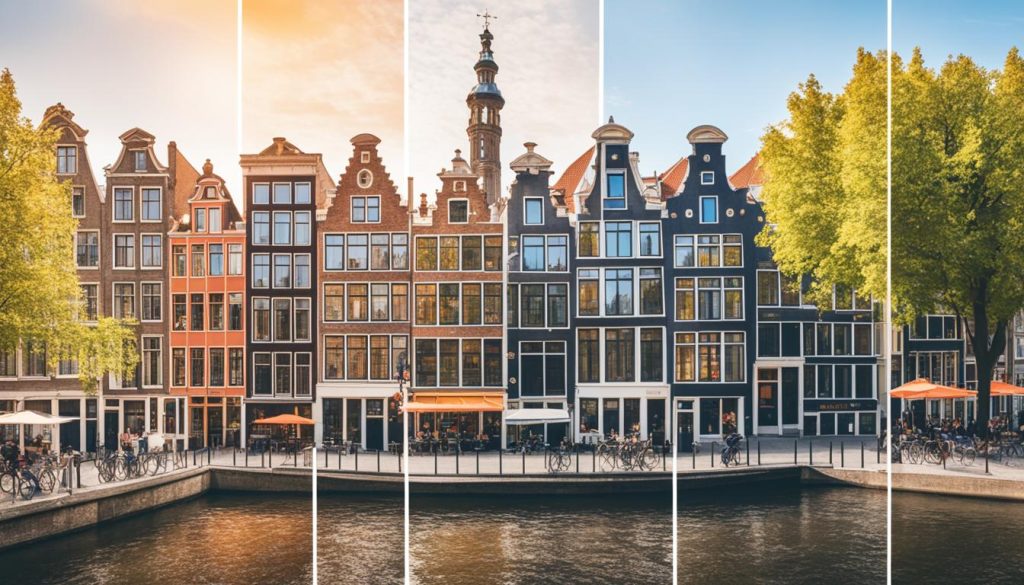
Searching for a high quality of life is important in Belgium, Spain, and the Netherlands. These countries show how to mix work and fun well. They prove that when work and life balance, society becomes happier.
In Belgium, people love spending time and money on food and meeting friends. This shows how much they value a good lifestyle. Spain values rest and free time, shown by the siesta tradition. The Netherlands supports flexible work, like part-time jobs and working from home. This helps people have a good work and personal life balance.
- Comprehensive healthcare systems help people live healthy, productive lives.
- Good education and job chances help people grow and help their communities.
- Encouraging cycling and walking in cities promotes health and cares for the environment.
These countries also think work-life balance is key in business. By offering flexible hours and caring for employee happiness, companies work better. This creates a space where creativity and efficiency bloom, helping the economy and quality of life.
These nations really focus on making life better for everyone. Their approach shows how to create a balanced, joyful, and thriving society.
Art, Cuisine, and Leisure: The Cultural Factors in Business
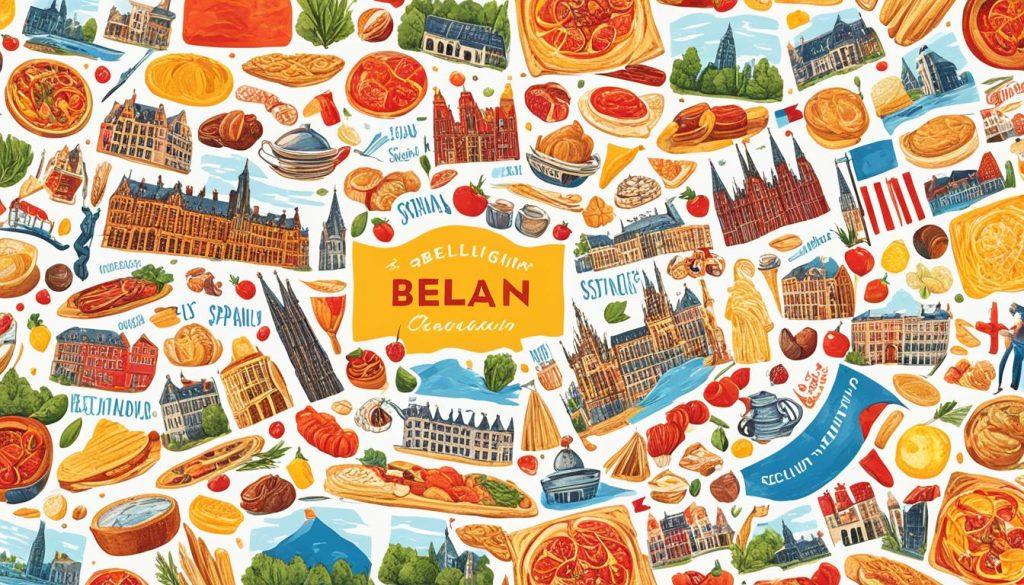
The way business blends with cultural expressions is key in forming commercial identities. In Belgium, Spain, and the Netherlands, their rich cultural heritage shows how the arts, gastronomy, and leisure mix in business. Let’s explore what makes these cultures stand out in the global business arena.
-
Belgian Gastronomy and Breweries:
Belgian gastronomy, known for its chocolates and beers, influences more than just leisure. It plays a big part in business meetings and networking events. This shows Belgium’s passion for fine food and how it shapes business hospitality.
-
Spanish Culinary Finesse:
Spain’s culinary arts, from tapas to paellas, add warmth to business dealings. Its diverse food practices help start conversations and build trust among business partners.
-
Dutch Design and Architecture:
The Netherlands is celebrated for its minimal design and cutting-edge architecture. These traits highlight a balance of practicality and vision in business. It’s about crafting workspaces that inspire new ideas.
These cultural elements in business do more than just broaden networking. They also help Belgium, Spain, and the Netherlands make a mark on the world stage.
Urban Development and Infrastructure
Belgium, Spain, and the Netherlands are leaders in urban planning. They combine functionality with innovation. Their advanced urban landscapes support smart city concepts. These cities showcase modern living and boost the economy. They lead to growth and well-being for everyone.
Smart Cities and Connectivity
Belgium, Spain, and the Netherlands use cutting-edge tech in their smart cities. They’re improving life by using data and the Internet of Things (IoT). These technologies help in saving energy, reducing waste, and improving living standards. Cities become more connected, making life easier and better for people.
Economic growth in these countries benefits from smart urban planning and tech. Examples include Belgium’s Smart Flanders, Spain’s Smart City projects, and Amsterdam Smart City. Digital innovations push these countries towards further success.
Infrastructure’s Role in Economic Growth
Strong infrastructure is key to any thriving economy. Good transport, digital connections, and green energy are essential. These elements have boosted the economies of Belgium, Spain, and the Netherlands. They encouraged trade and investments, both locally and internationally.
Officials in these countries are enhancing urban planning. They see its importance for economic growth and stability. These smart cities invest in a bright future. They aim for resilience and lasting prosperity.
Regional Political Stability and Business Security
A strong international business scene needs a nation that’s stable politically and safe for investments. Belgium and the Netherlands show this well with their solid politics. They are known as places where international business can thrive safely.
Governance and Economic Policy
Belgium shows how federalism can lead to stability. It brings together diverse groups in harmony. The Netherlands also stands out with its coalition government. This ensures steady governance and economic policies. Both countries are seen as safe places for investing and growing a business.
International Relations and Investment Climate
Strong international ties are key to keeping investments safe. Both nations excel in creating good diplomatic relationships. This helps in trade and strengthens political bonds. Belgium is important for hosting big organizations like the EU and NATO. The Netherlands is known for its effective diplomacy. These points make the area attractive to investors looking for long-term opportunities.
Tech Hubs and Innovation in Business
Belgium and the Netherlands are changing the European business scene. They are becoming key players in technological innovation. Their tech hubs are shaping business and tech futures, competing with world-known tech giants.
Business incubators in these nations help startups grow into big companies. They offer a space for creativity and progress, similar to Silicon Valley. Here, entrepreneurs and tech lovers meet to share groundbreaking ideas.
- Fostering environments where young companies can access cutting-edge resources.
- Empowering innovation with mentorship from industry leaders and pioneers.
- Connecting startups with potential investors and global markets.
Belgium and the Netherlands are leaders in the tech world, not just participants. Their hubs support knowledge sharing, boosting advancements in biotech, digital health, and AI.
Thus, these nations are modern centers of innovation, not just Europe’s historical gems. They lead the way in technological innovation, playing major roles in the global economy.
Business and Culture Coalescence
The fabric of international business mixes with various cultural traditions. Countries like Belgium, Spain, and the Netherlands are leading examples. They show that mingling cultures in business is key for success in the global market.
Integration of Culture into Business Models
Companies in these countries are adopting cross-cultural strategies. This move is crucial for both big corporations and small businesses. Understanding cultural differences helps them meet their economic goals better.
Cultural integration affects both internal operations and how companies deal with clients. Inside, teams learn to work well in a multicultural setting. Outside, they tailor products and services to meet cultural needs. This approach is now essential for success.
Adaptation to Multicultural Business Environments
Adapting to diverse business environments means valuing diversity and building international connections. Companies use their employees’ varied backgrounds to improve cross-cultural skills. This helps them deal with the complex social and business customs in Belgium, Spain, and the Netherlands.
- Building networks that span cultural divides ensures resilience and adaptability.
- Engaging with local partners provides invaluable insights into the consumer psyche.
- Adopting flexible strategies allows for swift reactions to cultural market shifts.
Companies in these areas are embedding global culture into their plans. Through partnerships, hiring, or marketing, the push for cultural harmony is clear. It shows how global business is changing today.
Conclusion
The business and culture mix in Belgium, Spain, and the Netherlands shows a rich blend of variety and unity. This comparison shines a light on how each nation approaches business, influenced by deep cultural roots. Understanding the economic climates and cultural details is key for those working in these markets.
These countries mix tradition with modernity, balancing formality with friendly connections. They also combine strong business bases with deep historical backgrounds. This unique mix needs careful understanding for effective navigation in their markets. Success comes from both strategic plans and recognising cultural dynamics.
This journey through countries highlights culture’s role in business. For the global audience eyeing Europe, knowing these settings is crucial. A deep understanding of past influences, current trends, and future directions is a must for success in the European economy.

